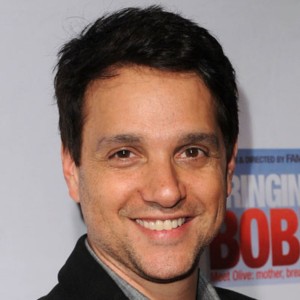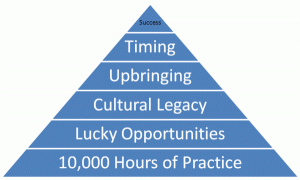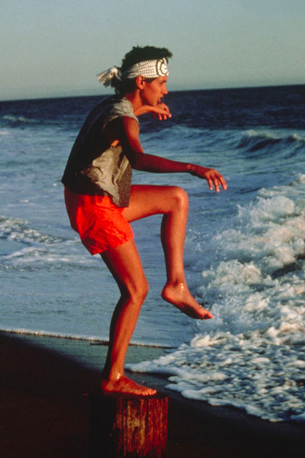 aNewDomain — For about two days in the early 2000s, I played Pop-Cap games. Specifically, the poetry wall game.
aNewDomain — For about two days in the early 2000s, I played Pop-Cap games. Specifically, the poetry wall game.
You had like 30 seconds to grab the refrigerator magnet words and move them around into sentences. I guess the creator thought we’d make poetry. Maybe some of us did, I can’t be sure.
Anyway in the poetry wall game, your peers would rate all the submissions and assign a winner. And it never failed: That winner was always the person who wrote the most obvious dirty thing with the words on hand.
In other words, you could write a work of poetry to rival Issa, but it really didn’t matter: The guy who wrote the dick joke would always win.
Novelist David Wong did an excellent bit on how much harder things are than we think they should be (insert dick joke here). He wrote:
I think The Karate Kid ruined the modern world … not just that movie, but all of the movies like it. Basically any movie with a training montage … You know what I’m talking about; the main character is very bad at something, then there is a sequence in the middle of the film set to upbeat music that shows him practicing. When it’s done, he’s an expert.”
We believe that if we can train, we can succeed. But that is just a lie.
You go to school for 20 years, for instance. You emerge unto the world with a doctorate. And then you expect the world to automatically have a job for you, a job where you can do what you spent all those years training for?

Please.
That’s how it happened for me. I don’t blame Karate kid Ralph Macchio (at right). But then, how can you blame him? I mean, look at the guy. I just want to hug his face. Don’t you? And, basically I spent 10 hours a week, every week, for a year filling out job applications and sending resumes. In return I received a grand total of four callbacks.
I got hired at two of those places part-time, but the other two places didn’t like me. And the other 126,497 jobs could hardly be bothered with a form letter.
Should you just blame others for your failures?
In his post, Wong suggests that we like to blame others for our failures, and that’s correct.
But if you blame other people for your failure, sometimes you are 100 percent right.

If you want to break into music, you have to understand that almost all the money has been leached out of it. Between the Internet and … well, basically the Internet, you can’t make a living selling records anymore. Touring is where the cash is, and you just kind of figure your songs are going to get stolen and heard for free however else you release them.
And if you want to write, you’re in the same bind. There are a million people who want to write. Okay, I meant “million” as an exaggeration, but even that number grossly underestimates the number of people who want you to buy their print products — by a large margin. The webs have made it so any sap can self-publish a novel — or a book of selfies, whatever. And even getting someone to agree to take 10 percent of your future sales so you could get an editor to even consider publishing your stuff is a monumental feat. It’s a feat for which many have to take classes.
And there you have it: More fruitless training.
In the education field, you probably feel like there just aren’t good jobs out there anymore. And you’re pretty right.
About seventy-five percent of us are now contingent faculty, we work as at-will, part-time employess. So you can go on Higher Ed Jobs and find some full-time positions, but the requirements even to apply are now stratospheric, and so many people are competing for so few positions that screeners are actually looking for reasons to dump you in the circular file. “Look at this sap, writing in Times New Roman,” they’ll scoff. “That’s so yesterday.”
Thunk.
In essence, it’s statistically verifiable that the money is moving to the top; not slowly but at a really depressing rate. So if things seem hopeless and that the world is against you, that there are forces beyond your control at work, sadly, you’re probably right.
Just because you’re paranoid doesn’t make you wrong.
Here’s the thing. These days, no matter what it is you want to do, you’ve got to be the stone-cold best at it. And screw Malcolm Gladwell’s 10,000-hour rule (right). Seriously. Gladwell never said becoming a master of your trade would lead to success, just that it would give you a shot. And it does: It gets you a really, really weak shot.

I was at a writing convention this spring. It’s one of the various things I do to increase the odds of my success in writing, other than writing.
There were speakers at each meal, and all but one of them had the same story to tell.
That story went like this: “I was poor, I worked my ass off, I took some chances that didn’t pay off. When I recovered from the flesh-eating bacteria, or the broken back, or the long series of funerals, finally I got a book published and it bombed. Then I had to start at square one again. And now, 18 years and a spleen removal later, I’ve moderately succeeded.”
Then there was this next guy. He made the room kind of angry, actually, because we were all onboard with that message of everyone-can-make-it-just-starve-till-you-win. This guy got up and basically said this: “I was making a crapload of money in the family business, but I didn’t like that too much so I decided to quit and write books. I wrote one book and I couldn’t sell it, but some famous guy wrote in and hired me to ghostwrite for him for ten years. Now I’m rich and get to tell you how easy it is!”
Yeah, some people just get lucky.
Most of us writers love to bag on E.L James, did you know that? James is the founder of a whole new genre of fiction: shiterature.

James’ lack of talent, lack of technical ability, lack of basic grammar or reasoning skills and lack of being sued to death for copyright infringement pissed off most writers to no end.
You know, 50 Shades of Grey was just fan-fiction that happened to trend. Talk about luck.
But you know, some people do win the lottery. They get hired right out of graduate school, they’re born to be seven feet tall and end up with multimillion dollar NBA contract or whatever.
But the rest of us, we have to do those 10,000 hours. And then 10,000 more. And 10,000 more after that. We can never quit.
That’s what Wong seems to mean when he says there is a certain “sticker shock” on success.
It isn’t Ralph Macchio’s training montage that makes us think we deserve a win, it’s all those annoying losers who seem to win so undeservedly.
Snookie gets to write romance novels. Kim gets to publish a book of selfies. Another mediocre blogger gets a seven figure book and film contract. The hacks in your writing groups get contracts as you get a long series of sad head-shakes and form letter rejections.
Do your 10,000 hours. Then do 10,000 more.
I got my start as a columnist writing for The New Existentialists. They asked me to do two bits month. That was hard, at first. Two new ideas every month? Are you high? I can’t do my three regular jobs and write 2000 words.
But then other writers would miss their deadlines and the editors would ask me if I had anything in the pipe for them. I’d come up with something. Soon I was doing four bits a month, sometimes five.
When TNE went away, I was picked up really quickly by aNewDomain. It was one of those winning-the-lottery moments, two people whose needs coincided being in the same place at the same time. My editor started out publishing 3-4 of my bits each week. Now if I don’t do one a day, she’s in my email reminding me.
I went from not being able to do two bits a month to some days writing two bits a day, every day. Writing without cease, as they say.
Additionally, I started writing novels again at the end of 2013. Since then I’ve written eight of them. While it was initially hard to come up with 2000 words a day, now I can turn around 9000 if I get to focus on the job (and want to).
I passed the 10,000 hour mark a long time ago. I used to write four hours a day for graduate school, and I’ve been writing on the side since I was 13. I finished my first novel at 15.
That was more than 20 years ago, and I won’t say how many more years than 20.
I’m working on a novel right now that will never see the light of day. I’m writing a whole novel just to practice one element of story writing.
Maybe you will get lucky. That’s a step in Gladwell’s little pyramid, of course.
But when opportunity knocks, you have to do more than open the door. You have to be the best one for the opportunity.
My advice: Train relentlessly as much as you can for as long as you can. And then get out there and shake the trees.
Get rejected, as most sane authors will tell you. You aren’t E. L. James or Shaquille O’Neil. To his credit, Shaq didn’t stop at being born with perfect genes for size but proceeded to work incredibly hard forever. And that’s what I say you should do.
Work hard, get a little lucky, learn to work harder, wait on the next big break.
I have to go make dinner now and think of the next thing to write. Then again, maybe there’s a way to rearrange all these words into a dick joke. Ed: Dick joke deleted. Sorry, Jason.
For aNewDomain, I’m Jason Dias.
Image one of Ralph Macchio: Biography.com, All Rights Reserved; image two of Macchio in “The Karate Kid”: tnation.t-nation.com, All Rights Reserved; image three: PlaceOfPersistence.com, All Rights Reserved; image four: Pinterest.com, All Rights Reserved.













